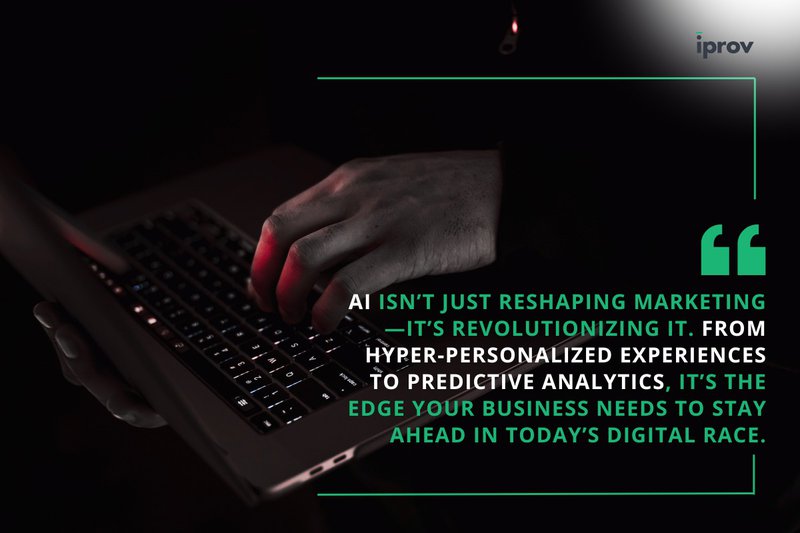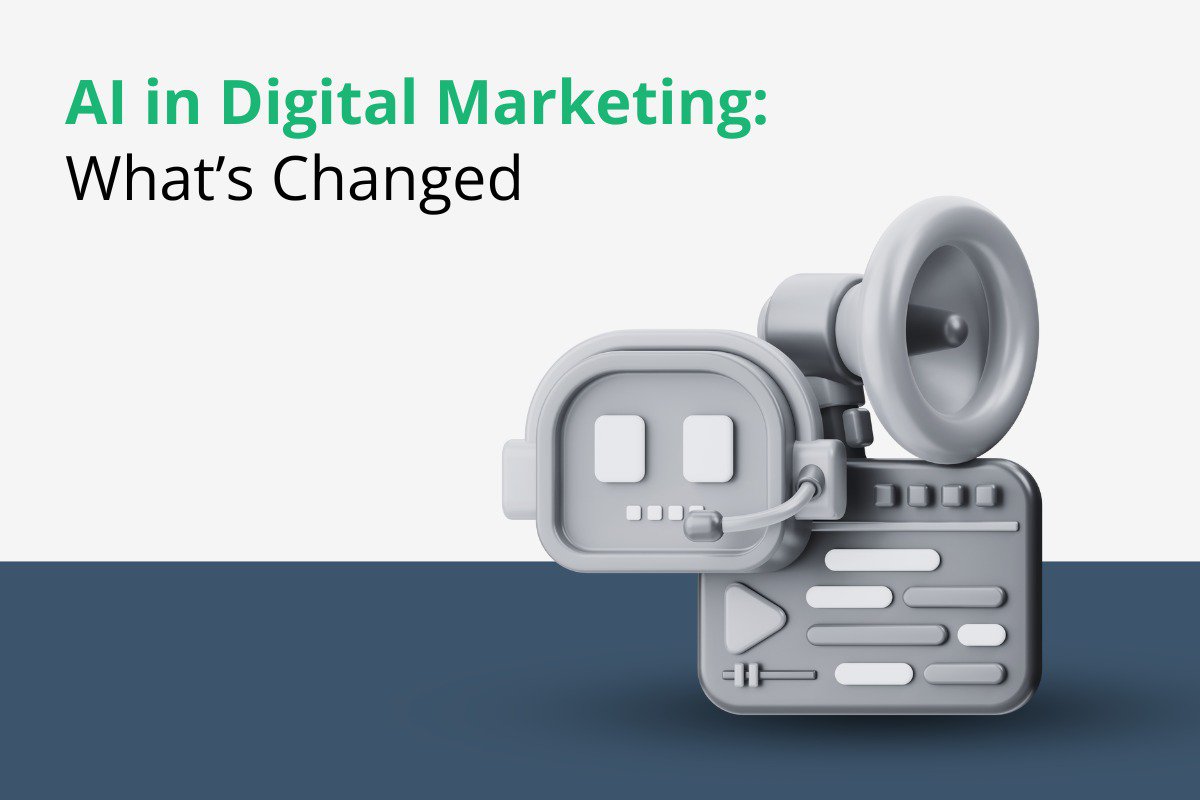Is AI changing marketing forever? Definitely—and fast. Small and medium-sized businesses in fields like healthcare and tech are rethinking strategies with AI tools that create content, analyze data, and personalize customer experiences. If you want to grow your brand and make marketing more efficient, it’s time to explore how AI works in digital marketing and what opportunities it offers.
Key Takeaways:
- Content Creation: AI tools (e.g., GPT models) simplify content generation for blogs, ads, and social media, increasing speed and consistency.
- Advertising Optimization: AI examines large data sets to automate ad placements, targeting, and design decisions, minimizing wasted resources.
- Marketing Automation: Chatbots and other AI tools automate tasks like emails and data analysis, and provide fast, customized customer interactions.
- Predictive Analytics: AI predicts customer behavior to enrich digital marketing strategies with data-based personalization and customer journey insights.
- Personalization: AI enables ultra-personalized recommendations, dynamic website layouts, and scalable customer interactions to improve engagement and loyalty.
- ROI Improvement: AI helps with budget optimization, effective A/B testing, and real-time campaign adjustments to increase ROI.
- Ethical Challenges: Data privacy, algorithm bias, and excessive personalization remain challenges that can be managed through transparency and ethical practices.
- Success Stories: Brands like Netflix, Sephora, and Starbucks use AI for personalized recommendations, customer insights, and predictive analytics to increase engagement.
- Future Trends: Expect advancements like trend forecasting, adaptive engagement tools, and industry-specific innovations across retail, healthcare, and automotive sectors.

The Core Applications of AI in Digital Marketing
Content Creation
AI has transformed the way digital marketing works. One significant contribution is its role in content creation. AI generates ideas, drafts, and refines written content. Tools like GPT models craft entire blogs, website copy, and engaging social media posts. This saves marketers valuable time while ensuring consistency, helping teams stay productive.
Machine Learning
Machine learning allows marketers to sift through enormous data sets to find patterns human marketers might miss. AI can determine things like optimal ad timing, segmented target audiences, and designs that are most likely to perform well. These automated processes reduce wasted time.
Automation
Marketing becomes even more manageable with AI automation. Routine tasks like email scheduling or campaign tracking require less human oversight, freeing up time for developing ideas and strategy. Chatbots, for example, handle customer inquiries instantly, improving satisfaction with faster responses.
For more on how these tools are helping businesses, see The Future of Marketing.
How Businesses Can Benefit from Predictive Analytics
In terms of AI in digital marketing, predictive analytics is like a marketing crystal ball. It uses past data to forecast customer behavior, revealing which customers may buy again or are likely to leave. By using AI to analyze these patterns, businesses can efficiently anticipate needs and fine-tune campaigns for greater impact.
Tools that examine browsing histories, purchase behaviors, and preferences go a step further. They don’t just determine that a customer likes running shoes—they identify exactly what style, brand, and time of year the customer is likely to buy. These insights help tailor outreach efforts, ensuring they resonate with the right user at the right time.
Customer journey mapping takes predictive analytics even further. With journey mapping, AI creates visual pathways that show a customer’s every interaction with your brand. It can pinpoint drop-offs, like customers abandoning their carts, and suggest fixes, such as simplifying the checkout process. Companies using tools like these often see better results, including higher ROI and greater customer satisfaction.
Real-time data also empowers campaigns to adapt. AI might, for instance, detect that an email subject line isn’t getting enough attention and recommend a more engaging alternative immediately. Unlike older methods, these systems don’t guess—they rely on comprehensive analytics to deliver actionable solutions.
With predictive analytics, marketers can stop guessing and start acting with precision. The advantage lies in anticipating customer actions and meeting their needs proactively. For compelling examples of predictive analytics at work, read McKinsey’s AI and Customer Engagement.
Personalizing the Customer Experience with AI
Personalization—especially when it comes to AI in digital marketing—is no longer just a buzzword. It’s become a standard for businesses looking to stay competitive. AI has made connecting with audience segments easier and more impactful.
Hyper-personalization—not just broad categories, but insights like browsing habits and past interactions—ensures that marketing content feels more relevant to individual customers. This encourages stronger engagement and builds loyalty.
For example, take personalized product recommendations: companies like Amazon and Netflix use AI to anticipate customer preferences. Algorithms process individual activity data to suggest items that feel uniquely fitting. These small touches drive repeat interactions while increasing overall sales.
Scaling this kind of personalization across a large audience can be difficult, but AI makes it manageable. Chatbots and recommendation engines allow businesses to engage customers at scale. These tools respond to real-time data while simulating human interaction. For instance, they tailor website layouts or highlight offers based on live browsing behavior.
To find out how such tech fits into your existing strategies, visit Building Your Marketing Technology Stack.

Enhancing ROI with AI
The use of AI tools in digital marketing is reshaping how companies approach budgets and ad success measurement. One way they help is by detecting areas of overspending. Tracking campaign effectiveness in real time, these tools can identify where resources are being used inefficiently and suggest adjustments.
AI also transforms A/B testing. Instead of comparing just two options, AI can run dozens of tests at once and quickly figure out which elements perform best. The result? Faster optimization and stronger conversion rates.
For maximum ROI, businesses should use AI for not just analysis but decision-making. For example, predictive analytics flag customer trends early, while segmentation tools assisted by machine learning target audiences with precise messaging. Automation tools free up human teams to focus on creative strategies that can drive growth. Thoughtful use of these tools can pave the way toward significantly higher returns on marketing investments.
What Ethical Challenges Do Marketers Face When Using AI?
While AI offers exciting possibilities, it also raises ethical concerns. Data use is one of the biggest issues. Many tools depend on tracking consumer activity like browsing habits or purchase history, but the average customer may not be fully aware of this. Transparently informing your customers how you use their data helps address these concerns, as does compliance with laws like Europe’s General Data Protection Regulation (GDPR) or the California Consumer Privacy Act (CCPA).
Bias in AI models can cause additional problems. AI systems learn from existing data, which can reflect outdated or unfair assumptions. Ensuring fairness requires teams to monitor and fix algorithmic biases before launching campaigns. Regular audits and diverse datasets are key to avoiding ethical missteps.
There’s also the issue of manipulation. Highly personalized AI messaging can make consumers feel targeted to a degree that feels invasive. Tactics should focus on fostering trust, not exploiting customer vulnerabilities. Following ethical guidelines helps brands stay accountable.
Striking a balance between innovation and responsibility is vital for long-term success. For a deeper dive into these challenges and best practices, visit Forbes’ Ethical AI in Marketing.
Success Stories of AI in Digital Marketing
Big brands have already seen amazing results using AI. Netflix, for example, excels at crafting viewing recommendations based on individual habits. By leveraging AI insights, it doesn’t just present genre-based suggestions—it narrows them to perfectly match each user’s taste. That level of relevance keeps subscribers engaged for longer.
Sephora’s AI-driven solutions are equally noteworthy. Their Color Match tool, which analyzes skin tones and preferences, helps customers find the perfect product with confidence. This reduces returns and improves online shopping experiences—both significant wins in e-commerce.
Predictive analytics also help companies like Starbucks engage customers at the perfect moment: by studying purchase patterns and even factoring in the local weather, Starbucks uses AI to deliver coupons or promos that anticipate when a customer might visit next. These strategies are a great example of how data-backed predictions can improve consistency and loyalty.
Where Is AI Heading in Digital Marketing?
AI is transforming the way marketing works, and its influence keeps growing. Expect AI to continue reshaping trends, from predicting seasonal demand to adapting campaigns for real-time consumer behavior. Industries like retail and entertainment are already leveraging smart prediction tools to manage personalized outreach and resources effectively.
Upcoming innovations in natural language processing (NLP) and generative AI will push content creation further. Entire ad campaigns, for instance, could be designed and optimized by AI based on audience data.
AI is driving smarter workflows, better engagement, and stronger results across the board. By addressing ethical concerns and embracing these advanced tools responsibly, businesses can remain competitive and forward-thinking.
Are you ready to take the next step? For businesses looking at integrating these capabilities, picking the right software is critical. Options vary widely, so you’ll need to review tools based on their size and objectives. At iProv, we’ve made a resource to help: Finding the Right Marketing Automation Software.
To deepen your understanding of how these trends could impact your digital marketing strategy, get in touch with iProv today. We’ll help you discover and implement the AI tools you need to benefit your business—saving you time, money, and effort.


Leave a Reply